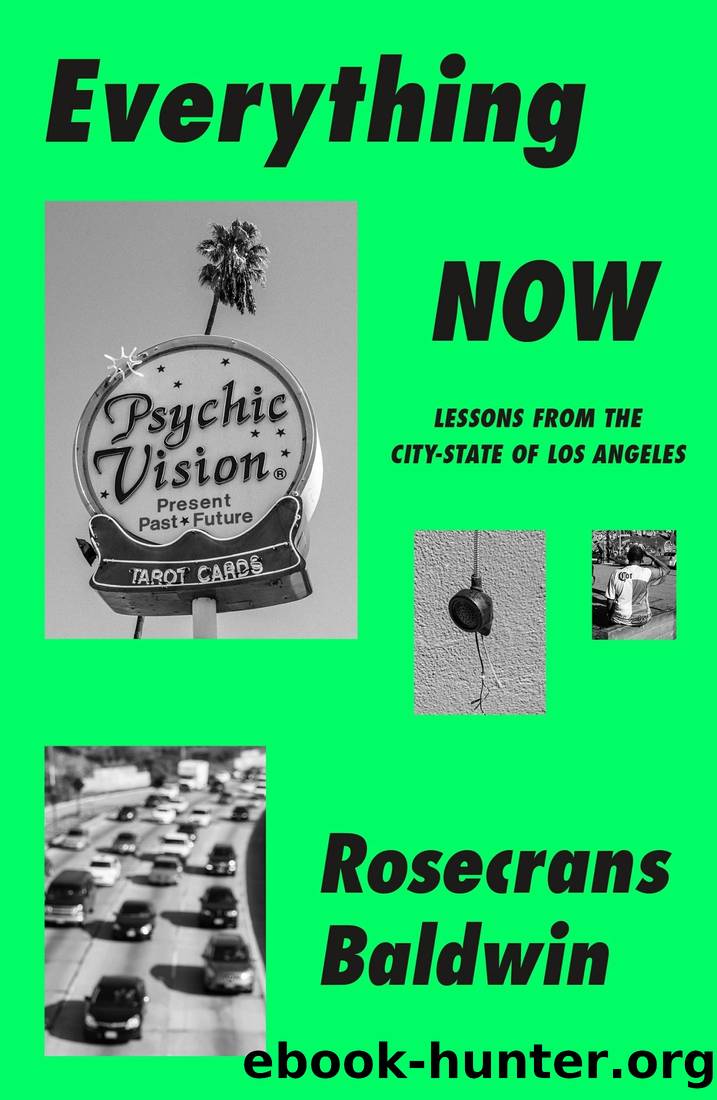Everything Now by Rosecrans Baldwin

Author:Rosecrans Baldwin [Baldwin, Rosecrans]
Language: eng
Format: epub
5.2â â â â Los Angeles probably has no single unifying dream besides the straightforward desire to be loved or not die in an earthquakeâor perhaps not feel so alone in the vastness of the immense slouching shapelessnessâbut if there is one narrative that outsiders pin to the city-state, stocked with clichés but also some essential truths, it is often the dream of Hollywood.
No matter what industry a citizen works in, the entertainment business often feels like an alien ship hovering over the county, spewing out chemtrails that breeze around the world. Film, television, music. Icons of celebrity culture and âreality programming,â including the Hollywood sign itself, erected in 1923 as a stunt to promote a real estate development. It was viewable from our block. Every day I watched tourists pose outside our house for a picture with the big abstractionâthat embodiment of fame, stepping into the limelight, becoming âlike the Hollywood sign itself, instantly recognizable,â as Leo Braudy put it in The Hollywood Sign.
And yet the vast majority of Los Angeles has no more connection to âHollywoodââthe business, not the actual neighborhoodâthan the average moviegoer in Shanghai, except maybe the one time they saw a famous actor running errands. (A weekday morning, Ian Ziering, from Beverly Hills 90210, pushed a cart through the parking lot of a grocery store on Sunset and Fairfax, and a man lying on the sidewalk remarked loudly, âLooking big, Ian!â Ziering shouted back, âAll natural! Protein, yo!â) The actual neighborhood of Hollywood wasnât home to studios and stars, but instead many smack addicts, many two a.m. men looking to pay a little extra for a little extra, not to mention a long-standing Latin community, also elderly Russians. âWe were still ethnic here,â Karolina Waclawiak wrote in How to Get into the Twin Palms. âWhen people walked by, they would point at the windows and say things like, âWhy are they drying their clothes outside? Arenât they afraid theyâll get stolen?ââ
Of course, âHollywoodâ was still very big business, big icon, big macher. And, in its own way, âHollywoodâ was L.A. and the sign was L.A., and the people who worked in âHollywood,â the business that had for a long time mostly taken place in villages and neighborhoods scattered around the city-state that werenât named HollywoodâToluca Lake, Burbank, Culver Cityâwere also L.A., though those people often spoke as if everyone else in L.A. worked in the business of âHollywoodâ too, which could be off-putting. As though everyone had friends in common from college in Middletown, New Haven, or Boston. Everyone had spent years afterward in Brooklyn or Austin. Everyone likewise communicated to one another in a way to suggest, whether or not they liked the work itself, that they didnât live in earthbound Los Angeles so much as in Hollywoodâs hovering citadel, a flying vehicle that occasionally drifted away to Atlanta, or Vancouverâor Park City, Utahâaffording first-class views and snacks to those with union cards. As Carey McWilliams once wrote, âWhere motion pictures are made, there is Hollywood.â
So Hollywood was
Download
This site does not store any files on its server. We only index and link to content provided by other sites. Please contact the content providers to delete copyright contents if any and email us, we'll remove relevant links or contents immediately.
Spare by Prince Harry The Duke of Sussex(5162)
Machine Learning at Scale with H2O by Gregory Keys | David Whiting(4276)
Never by Ken Follett(3910)
Harry Potter and the Goblet Of Fire by J.K. Rowling(3829)
I Have Something to Say by John Bowe(3486)
Unfinished: A Memoir by Priyanka Chopra Jonas(3361)
Fairy Tale by Stephen King(3344)
Greenlights by Matthew McConaughey(3132)
The Man Who Died Twice by Richard Osman(3050)
Will by Will Smith(2888)
Think Again by Adam Grant(2446)
Rationality by Steven Pinker(2335)
It Starts With Us (It Ends with Us #2) by Colleen Hoover(2307)
Can't Hurt Me: Master Your Mind and Defy the Odds - Clean Edition by David Goggins(2303)
The Dark Hours by Michael Connelly(2287)
The Storyteller by Dave Grohl(2209)
Friends, Lovers, and the Big Terrible Thing by Matthew Perry(2202)
The Dawn of Everything: A New History of Humanity by David Graeber & David Wengrow(2174)
The Becoming by Nora Roberts(2174)
